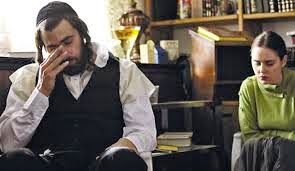I cling to the outdated and banal notion that the cinema ought to be fun.
At the moment there seems to be a bit of fixation in Hollywood with to biopics about unusual and outstanding scientists.
That’s produced two highly entertaining films marked by some fine performances. I find Alan Turing exceptionally interesting. My admiration isn’t limited to his role in breaking the Germans’ Enigma code in World War 2, but is based at least as much on the thinking that prepared him for that work, and which he took further through it, on what has come to be known as the “Turing Machine.” That theoretical model of a fully automated, mechanical process underlies all modern computing.
And then there’s the bitter tragedy of his life. Hounded to his death by the police in a Britain that still had laws against homosexuality, to which it sacrificed one of its most original thinkers.
 |
| Turing with the boys of Hut 8. One of whom happened to be a woman |
The Theory of Everything does something slightly odd in the genre, by telling the story of a living scientist, in this instance Stephen Hawking. The performance of Eddie Redmayne in the lead role is outstanding; he contorts his face to try to look like someone suffering from Motor Neurone Disease to the point where at times I wondered how he could keep acting. And at other times whether I was really looking at Hawking.
 |
| Stephen and Jane. In the short time before the MND struck |
The French playwright Jean Giraudoux called one of his plays Amphytrion 38, on the grounds that he could count 37 previous treatments of the Greek myth of Amphytrion. On that basis, Ex Machina could probably be referred to as Pygmalion 99, though 99 may be a low estimate.
You know the story: a man (yes, it’s always a man), somehow fashions a woman (and, yes, she’s never particularly hard on the eyes). Then he falls in love with her and finds that she doesn’t entirely reciprocate his feelings, if she reciprocates them at all.
 |
| Alicia Vikander in Ex Machina making it clear you play at being a god at your own peril |
And then finally there’s the film which even I have to admit is probably pretty rubbish, but which I enjoyed all the same. It’s embarrassing to admit, but I like sports films (as I like thrillers and court room dramas – all I have to see is police milling around with forensics experts in white suits, or lawyers going at each other hammer and tongs, to want to see more).
Now most sports films follow one tried and tested formula: team doing appalling badly after suicide of star player/gaoling of manager/ghastly accident killing half the players (delete as applicable); new dynamic manager/fading star breaking from alcoholism/young player ignored by agents due to poor physique (delete as applicable) joins and the victories start to pile up; after a suspense-laden semi-final won in the last gasp of match time, the team qualifies for the final of the prestigious knock-out championship; in that final, against the favoured team of the year, it either wins in a nail-bitingly close encounter despite attempts to cheat by the opposing side, or is beaten in a nail-bitingly close encounter from which it emerges head held high and with honour resplendent.
 |
| Kevin Costner being thoughtful in Draft Day, a film that requires little thought |
What gives the film its entertainment value is the negotiating process in which the leading character, played by Kevin Costner, trades with other team managers the right to make different picks among the players on offer, in order to maximise what he sees as the benefit for his own club.
It’s a decidedly second – well, probably tenth – rate film, but I enjoyed it.


